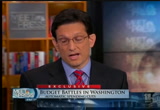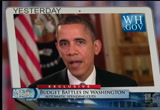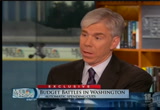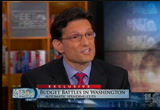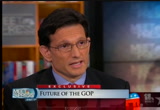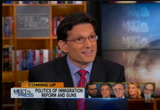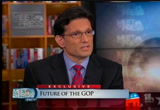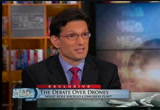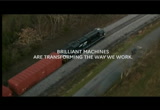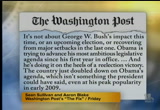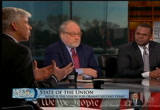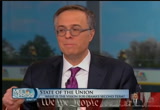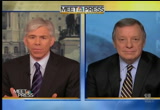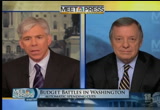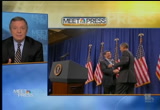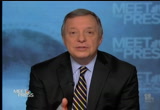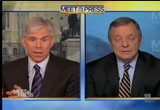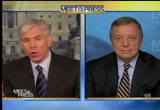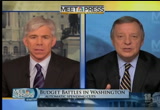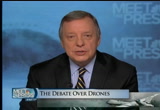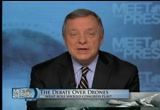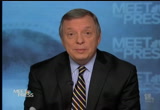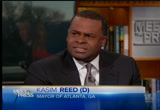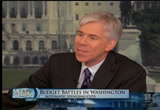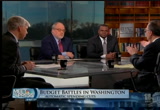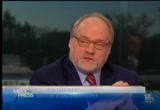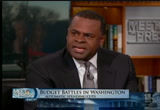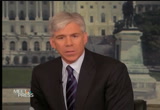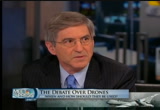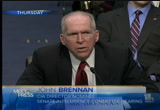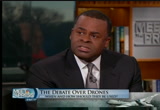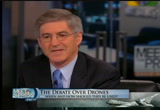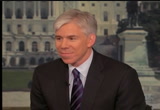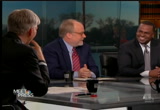tv Meet the Press NBC February 10, 2013 10:00am-11:00am EST
10:00 am
from nbc news in washington, the world's longest-running television program, this is "meet the press" meet. good sunday morning. we are following the big weather story in the northeast as this weekend's huge winter storm blanketed the region from new york to maine. new york city is getting the worst of it all. more than three feet of snow fell in parts of connecticut, rhode island, and massachusetts. cutting power and downing trees. electrical power remains out in nearly 350,000 homes whereas the area this morning. so a lot of cleanup to do there. meanwhile, the political climate has our attention here in washington as the president prepares to deliver his state of the union address tuesday night. as we begins a second term,
10:01 am
we're being told he will return to his primary message of how to restore economic growth. we'll talk to both sides this morning. majority leader eric cantor and assistant democratic leader in the senate dick durbin. i want to welcome you back to "meet the press." >> pleasure, david. thank you. >> there are so many areas that are contentious right now, and chief among them is the sequester word. this dirty word in washington, that means automatic spending cuts. it could begin in a matter of weeks with $85 billion in automatic cuts. do you really want this as a republican leader? look at the impact it would have in your state alone. the associated press wrote about this it this week. sequestration, today a political football would cripple virginia's economy if happens. potentially no state would suffer more than virginia. the commonwealth would lose more than $130,000 jobs, more than
10:02 am
any other states. not only is virginia home to the pentagon, the world's largest u.s. navy base, but a hub for major defense contractors such as aircraft builders. so the impact over 200,000 jobs, second only to california. you can't want this automatic spending cut to go forward. >> you know, clearly this is not, david, the best way to go about trying to chroontrol spending. and we have demonstrated in the house two separate occasions -- one of the bills we put across the floor and passed i was the sponsor of for that reason. these are indiscriminate cuts. we can do a lot better. what i hope to be able to hear from the president in the state of the union is he wants to join us in trying to effect much smarter cuts in spending. >> but that's what he's saying. >> we don't have to have the impact that you just described. >> why not work with him on short-term measure which he is
10:03 am
talking about to delay this, find a different way to go about some of the cuts? >> the problem is, david, every time you turn around the answer is to raise taxes. and, you know, he just got his tax hike on the wealthy. and you can't in this town every three months raise taxes. again, every time, that's his response. and we've got a spending problem. everybody knows it. the house has put forward an alternative plan, and there's been no response in any serious way from the senate or the white house. it's time we really have to do it. >> this is how the president responded to that in his saturday address. taking on the house plan and tried to put the pressure on republicans over this whole business of the automatic spending cut. >> right now, most members of congress, including many republicans, don't think it's a good idea to put thousands of jobs at risk and do unnecessary damage to our economy. and yet the current republican plan puts the burden avoiding those cuts mainly on seniors and middle class families.
10:04 am
they would rather ask more from the vast majority of americans and put our recovery at risk than close even a single tax loophole that benefits the wealthy. >> is the tax fight really over? is there not even tax reform that's possible? >> first of all, the tax fight for the president means higher taxes, more revenue. we can't be raising taxes every three months in this town, david. the bottom line is we want tax reform, but we want to plug those loopholes that the president talks about to bring down tax rates because we believe that's pro growth and we can get an economy growing again. let people who earn the money keep more of it. the president is not talking about that. what he's talking about is trying to raise more taxes for washington to spend the money. >> how does this end? in the end, republicans, from everybody i talked to, they could live with the across the board cutting. it would hurt your state deeply. it would hurt the defense industry. are you willing to just live with it? >> here's what i hope will happen. we have in our alternative several proposals that the president has actually come out
10:05 am
in favor of. there are improvements to the what's called the medicare provider tax, to get rid of the gimmick that states are playing. the president supports that. our plan says we have to bring a federal employee pension benefit down in line with the market rates. those are the kind of things that we're talking about as alternatives that make a lot more sense, that won't have the impact on the people who are out there working. you know, the president is the one who proposed the sequester in the first place. again, i'm questioning where this thing is going because he's not moved in any serious way. but we remain anxiously waiting for him to come to the table to work with us to solve this problem. >> bottom line, you could lose the sequester if it happens? >> i don't want to live with the sequester. i want reductions in spending that make sense. these indiscriminate reductions do not make sense, and we're going to hurt a lot of people. and it's up to the president really to act now. >> let me talk about immigration. you gave a big speech this week
10:06 am
where you talked about the future of the republican party. and to a lot of people listening, they heard a shift in position from you about how to deal with those illegal immigrants who are now in the country. maybe they were the children of illegal immigrants. this is what you said on tuesday. >> one of the great founding principles of our country was that children would not be punished for the mistakes of their parents. and it is time to provide an opportunity for legal residents and citizenship for those who were brought to this country as children and who know no other home. >> the question is, are you changing your position? are you moving to the middle? are you willing to go all in to bring conservatives in the house to the table to support a pathway to citizenship for those illegal immigrants already here? >> david, it's been over 10 years now where this problem has not been dealt with. and we have been unable to find any common ground. and what i said this week at the american enterprise institute
10:07 am
was that i thought the best place to start was with children. you know, these are children who due to no fault of their own were brought here, and we do have a tradition in our country. we are a country of immigrants. i'm a second generation american. my grandparents left the pogrom in arussia to realize a better life. again, these children were taken due to no fault of their own. it seems to me that's the place to start. >> you support the dream act? >> i have put out a proposal. i don't know what the dream act at this point is. what i say is, we've got a place, i think all of us can come together, and that is for the kids. >> can you bring conservatives look to supporting a pathway to citizenship for illegal immigrants who are here without having to first leave the country? >> there is a lot of movement right now in the house and the senate, both sides of the aisle, with folks having a lot of different ideas. i think -- >> yes or no to that question? you could really do it.
10:08 am
if you went all in, you could bring along the right in the house, couldn't you? >> i think a good place to start is with children. here's the difficulty in this issue, i think. and it is because we've got families who are here that have become part of the fabric of our country. and we want to make sure that we're compassionate and sensitive to their plight. these kids know no other place as home. on the other hand, we are a country of laws. we have a situation of border security that we have to get straight. we have to secure our borders. there is a balance that needs to take place. but the best place to begin, i think, is with the children. let's go ahead and get that under our belt. put a win on the board. and so we can promise a better life for those kids who are here due to no fault of their own. >> part of what you're talking about is rebranding the republican party. that was in part what your speech was about. and there's a lot of ferment right now in the republican party. what's the right direction for the party to get back into power beyond controlling the house, but to win national elections.
10:09 am
our political team on first read had its own reality check for what you and other republicans face. talking about the challenge for the republicans as a focus more on tone than policies. majorities of americans rejected some of the party's central principles, according to the exit polls from the november presidential election. for instance, 60% say income tax rates should go up on all americans or those with incomes above $250,000. 59% said abortion should be legal in all or most cases. it's rare to find politicians in washington who believe their political beliefs cost them an election or a policy defeat. they almost always blame communication. isn't this more than tone that's an issue? isn't it more than rebranding? isn't it some of the central beliefs of the republican party that hurt it with the electorate? >> we need to connect our conservative principles with helping people and making their life work again. and i talked about a man who is
10:10 am
a dad here in the inner city of the district of columbia, who all he wanted was to find a safe place for his kids to learn. he's got four kids. and he discovered after having fought with the local school system the opportunity scholarship program here in d.c., something that speaker boehner has been an extraordinary champion on. and he realized the benefits of that. and now all of his kids have had an opportunity to start in that school. one is at the university of the district of columbia today. i talked about working parents who are hourly wage earners who are having a tough time getting through the month right now. those are the things that people that we've got to be concerned about. i don't think that joseph kelly, the dad here in the district of columbia, cares one ioata about rebranding the republican or the democratic party. i think what we care about and what he cares about are his kids. that's what washington needs to remember. these are real problems. these people are having a tough
10:11 am
time. and we ought to be about providing relief to those who don't have a job and to those who do making their life work again. >> what you're talking about, as you admitted after your speech, is not really something that's going to be captured in new legislation. there are core beliefs of the republican party that the polls show were rejected by a national electorate that you want to try to recapture some of if you're going to get to become a national party. >> i'm not quite sure about legislation. we were going to have follow-up legislation to pretty much everything i spoke of this year. and that's the point. the point is, we've got to be talking about helping folks. you know, i've got a constituent that's 12 years old. her name is katie. she was diagnosed with cancer at age 1. can you imagine? that is a parent's nightmare, the worst nightmare. and the federal government has got a role in research and basic medical research trying to find cures for disease. we can work together on something like that. we've got so many issues. we know on the bigger
10:12 am
macroeconomic issues there's a really disagreement between us and the president. we ought to be making sure we manage down the debt and deficit. he doesn't share the commitment with us on that. so, ok, we're going to keep at it on that. but at the same time, you've got so many millions of americans who feel that they have become an afterthought. my purpose in saying this is we have conservative principles that actually can work for their life again. and that's what we're going to be about promoting. >> before you go, i want to ask you about the debate over drones. it's a key part of the president's national security policy. why hasn't congress passed any additional legislation to review drone policy, to really understand where there ought to be checks and balances in the time that's passed since the original authorization post-9/11 that gave the president the authority to have a kill list, as the president works off of, for drones? >> you know, i'm glad to hear that the administration has released the memo that is under discussion to our intelligence
10:13 am
committees in both the house and the senate. we're going to be about oversight and getting into examining that memo. but, you know, let's just say -- suffice it is to say, david, we have a terror threat out there. islamist extremists are out there still trying to kill americans and go after what we stand for in this world. and if we're going to continue to be the leading force for peace, prosperity, and security in this world, we're going to have to have the tools necessary to do so. and i believe we can strike that balance to employ technologies to do that, at the same time upholding constitutional rights. >> and you're not concerned about the current policy, even where it might target americans who join the enemy? >> again, this is no different than the policy perhaps that was in place before. we'll find out about that in the oversight that we'll pursue. >> all right. leader cantor, thank you for your time. i appreciate it. >> david, thanks. coming up, we'll preview the
10:14 am
president's state of the union address. i'll talk with one of his closest allies in the senate, senator dick durbin. plus, our political roundtable is here with reaction to leader cantor as well as insights and analysis of all the politics behind the big issues. gun control, immigration reform, and more, that the president will pursue in his second term. joining me, democratic mayor of atlanta kasim reed. former speechwriter for george w. bush, now columnist for "the washington post" michael gerson. strategist mike murphy, and bbc's katty kay. as well as michael isikoff who broke the headline this week about america's drone policy. all coming up after this short commercial break. "meet the press" is brought to you by northern trust, providing solid financial solutions for more than 123 years. look, every day we're using more and more energy.
10:15 am
the world needs more energy. where's it going to come from? ♪ that's why right here, in australia, chevron is building one of the biggest natural gas projects in the world. enough power for a city the size of singapore for 50 years. what's it going to do to the planet? natural gas is the cleanest conventional fuel there is. we've got to be smart about this. it's a smart way to go. ♪ transit fares! as in the 37 billion transit fares we help collect each year. no? oh, right. you're thinking of the 1.6 million daily customer care interactions xerox handles.
10:16 am
or the 900 million health insurance claims we process. so, it's no surprise to you that companies depend on today's xerox for services that simplify how work gets done. which is...pretty much what we've always stood for. with xerox, you're ready for real business. its unofficial creed is rain or shine, snow or sleet, we deliver your mail. but apparently the united states postal service was no match for saturday. this week it announced that starting in august saturday delivery will be no more. for many, the decision carries more symbolic consequences than practical. in the information age of emails, tweets, and text messages, what we affectionately call snail mail seems somewhat inpractical. but the bigger question is this. is the current model sustainable, even with the most recent change? while we live in a digital age, we still rely on the postal service's sprawling network to
10:17 am
connect even the most remote areas of the country. in fact, even fedex relies on the postal service. 21% of its shipments are delivered by the mailman. if you take into consideration what it cost the consumer to mail a first class letter from alaska to tallahassee, florida, the u.s. postal service does it at a bargain price of less than 50 cents. using a private carrier, it would cost 50 to 100 times as much. nevertheless, the postal service handles 45 billion fewer pieces of mail than just five years ago. last year after $16 billion shortfall, losing saturdays only saves $2 billion, and strips anywhere from 20,000 to 25,000 jobs from the payroll. we'll be back here on "meet the press" to talk to senator dick durbin and our political roundtable after this short dick durbin and our political round[ male announcer ]hort i've seen incredible things. otherworldly things. but there are some things i've never seen before. this ge jet engine can understand 5,000 data samples per second.
10:18 am
10:19 am
a talking car. but i'll tell you what impresses me. a talking train. this ge locomotive can tell you exactly where it is, what it's carrying, while using less fuel. delivering whatever the world needs, when it needs it. ♪ after all, what's the point of talking if you don't have something important to say? ♪ we are back. we're going to speak to the assistant democratic leader, senator dick durbin, in a
10:20 am
moment. but i want to begin with our roundtable. joining me here, mike murphy. democratic mayor of atlanta kasim reed. michael isikoff, who of course broke the drone story this week. ag katty kay. former speechwriter for president bush and columnist for "the washington post" michael gerson. here you are. i wanted everybody to weigh in on this moment. the president and how he approaches his -- the legislative end of his second term and his state of the union address. i thought "the washington post" summed it up will writing about it this week capturing the moment. this time it's not about george w. bush's impact or an upcoming election or recovering from major setbacks. obama is trying to advance his most ambitious legislative agenda since his first year in office, on the heels of a re-election victory. the country just doubled down on obama's agenda, which isn't something the president could have said even at his peak of popularity in early 2009. mike murphy, that's the backdrop.
10:21 am
how do you see his approach? >> well, i'm a critic of it, and i hope he changes it with the state of the union for this reason. there's no doubt he won fair and square. 66 million votes. but 61 million people voted to fire him. and about 230 congressional districts, those incumbents don't care about emails from the president and michelle. he has to get out of the way of immigration or the deal will blow up. and the republicans in the short-term have the politics to hunker down. in the mid term elections, some of the senate races are in places where the president is unpopular. so the path he started on, which was i've got a very broad agenda and i'm going to still keep a campaign style thing of pressuring you won't work with these guys, and that will result in gridlock for the country which is horrible. if he does nixon and china, he can have storied stuff. >> katty, how much does he feel he has to do when he feels at the height of his confidence at the moment? >> he's got this kind of fairly short window, where he's just been re-elected. his first state of the union
10:22 am
where he's not running for re-election. he can take that onboard and decide he's going to try and push his agenda. but the window is short because fairly soon the members of the house will start thinking about mid term elections. if he wants to get big things done, he'll have to do it soon. in 2012, he promised a fairer america. he raised taxes. with the house at the end of the year, we'll see if inequality levels start to come down in america. but the big thing he'll have to do is promise to get jobs for the country. we're living in a world where robots are cheap and efficient, and people are expensive and inefficient. he has to find a post manufacturing america and lay out a plan for it for job growth. and that's the single biggest priority. >> that's where the pivot will be. after the inaugural, he wants to get back to economic growth. >> i agree with that, and i think that's a smart part of the agenda. i'm not sure how much he can get done with this outside game he's been pursuing. just constantly beating up on the congress. highly ideological inaugural
10:23 am
address. he has to make the choice in this speech what i'm watching for is whether he tries to continue that dynamic, which is highly polarized, and doesn't get anything done, or whether he tries to break the did i am thatttha did i /* -- dynamic. and you can't break that dynamic without talking about entitlement reform. realistic tax reform that's actually pro growth tax reform. that would be a huge concession for the president. he'll have to do that to make the system work. >> we'll hear from more of our roundtable in just a minute. but now i want to bring in the democrat from illinois, senator dick durbin. senator, welcome back. >> good to be with you. >> you just heard leader cantor a couple of minutes ago. and i want to get your take on how this standoff, this new standoff on fiscal matters, ends over these automatic spending cuts. you heard the leader say we're not going to deal with any more tax hikes, but that's what the president wants. he wants a different way of
10:24 am
going about the spending cuts and some way to find some additional revenue. how is it going to end? >> david, sequestration was designed as a budget threat, not as a budget strategy. and i think all of us understand if it goes forward in less than three weeks it's going to have a dramatic negative impact on many agencies equally important on the economy. so we need to come together. what the president is proposing for the rest of this year at least is that we deal with the sequester the same we have the first two months, evenly split between revenue and cuts. i think that's a sensible approach. it's consistent with simpson-bowles, which many republicans say should be our standard, and it doesn't really impose a tax burden on middle income families. >> the president a year ago in his state of the union laid out kind of a battle line in terms of how he would deal with republicans. here's what he said. >> as long as i'm workith anyon chamber to build on this momentum. but i intend to fight
10:25 am
obstruction with action, and i will oppose any effort to return to the very same policies that brought on this economic crisis in the first place. >> let me ask you what he has to show for that. one year later, we're back to lurching from crisis to crisis. you know, it's so absurd to people outside of washington who have to scratch their heads and say wait a minute. this is the white house that proposed these automatic spending cuts and now they are saying it would be so awful. leon panetta, the defense secretary, saying it would hollow out the military and have grave reactions. this is not how washington is supposed to operate, is it? >> no, it's not. and let me explain. when the president proposed the sequester, it was as an incentive to those of us in congress to work together in a bipartisan way to solve these problems. it was supposed to be so awful that the supercommittee would finally reach a bipartisan agreement. but because they completely reject the revenue, it never happened. now that we have gone over fiscal cliff. we have proposed about roughly $700 billion in new taxes on the
10:26 am
wealthiest americans over the next 10 years. the president believes, and i agree, within tax reform we can find additional savings over the next 10 years. use that to move toward deficit reduction and still keep this economy moving forward. >> how do you gain this -- again, i go back to what the president said a year ago, that he would fight obstruction with action. what is it that he has to show for that? the one piece of action he got a year later was increased revenues, which is what we campaigned on. what else does he have to show for it? >> we went through an election, david. there was a pretty divisive time here in america. we made our choices, and the american people made a clear choice, i might say to mr. murphy. he did win fair and square. and i think his values and his policies, he spoke to them in the inaugural address, were the same he took to the country. so where are we today? there are positive signs. i listened to eric cantor. he is for the dream act. i introduced this 12 years ago. he's voted against it. now he's for it.
10:27 am
i believe he's for it. and that's progress. but i might say to him, for example, on immigration, we're moving on a bipartisan basis in the senate. senator mccain, lindsey graham, marco rubio, joining chuck schumer, bob menendez, and myself in a group trying to come up with a bipartisan solution. but it won't just apply to children. eric cantor's speech to the american enterprise institute, he quoted emma lazarus, and that great quotation found on the statue of liberty. it doesn't say i lift my lamp beside the golden door for children only. we have 11 million people in this country who need a pathway to citizenship. i hope that the republicans in the house and mr. cantor will embrace that as part of immigration reform. >> just to pin you down on that point, what i heard from him today was, look, we can get something along the lines of the dream act passed right away. and we may have to come back to this business of a pathway to citizenship for everybody else. but you think there's momentum in the senate side to deal with
10:28 am
everybody and deal with this pathway without illegal immigrants having to first go home? >> let me tell you this, david. the dream act means more to me than i can express. i met these young people. but they will tell you, yes, i want a future. but what about my mom and dad? you know, they understand full well that these family structures are critically important to the future of america. in the senate, we have a bipartisan goal of pathway to citizenship. not stopping at the dream act, beginning with the dream act and pushing forward. >> i want to get back to the automatic spending cuts and ask a fundamental question that i think republican critics of this president are asking. do you not concede that there is a spending problem in washington? even when it comes to the 50% cuts out of the sequester that are for the defense department. you have said in recent interviews, you could live with those. you don't like the manner in which the cuts would be made, but you could live with those cutbacks to the pentagon. so isn't there a spending problem here that must be addressed? >> absolutely. and i believe as chairman of the
10:29 am
defense appropriations subcommittee and in the senate that we can save money, cut waste in the pentagon, and not compromise our national security. but to do this in such a haphazard way over the remaining six or seven months is going to be unfair to the military and our families. think about this for a second. cutting back on psychological counseling for the members of the military and their family during the remainder of this year when we have this grievous problem of suicides in the military and readjustment when they come home from battle. we can't do that. >> but isn't there always a reason to spend the money in washington? >> no. >> can't you always find a reason not to cut? isn't this the republican argument that at least here, if worse comes to worse and the sequester happens, we'll at least get spending cuts. how else to force the president's hand? >> do we really want to base our spending cuts reducing medical research in america, on eliminating 70,000 children from head start, that early learning program that is so important? these things don't make sense.
10:30 am
let's sit down and do this in a thoughtful manner. and let's include revenue. we should have half of this as revenue from tax reform, and the other half in spending cuts. i support those spending cuts. >> let me talk to you about the drone controversy and the debate in washington. the "wall street journal" in its editorial on thursday wrote the following about sort of paybacks here and the hypocrisy argument. you may recall that mr. obama and eric holder before he came attorney general denounced the justice department memos that explained why waterboarding and other enhanced interrogation techniques were leader. yes, this crowd doesn't arrest and interrogate suspected terrorists. it merely blows them away with missiles from the sky. here is the political reality. this president, like the president before him, a republican, they both believe that in the war on terror, you
10:31 am
should have strong executive power which includes the ability that congress authorized for the president to independently kill people associated with al qaeda as he sees fit. do you believe there should be a change in that authorization? is that the debate we ought to have? >> let me tell you, david, two things. first, this president came to office. he's kept us safe with the best military in the world and the best intelligence agencies. and of course we know the fate of osama bin laden. at the same time, he's kept us out of further war. he understands that is something that shouldn't be done except in the most extreme circumstances. he made it clear that he would prohibit torture. he wanted to close guantanamo, and i supported him, but the rest of congress did not. and now he's trying to come up with a legal architect are ykt architecture to deal with the new war on terror. we'll hold hearings to work on this element, how to mesh the constitutional values with the
10:32 am
new world of war. it's a cyber war. it is a raging war between the united states and other countries that could be very damaging to us. >> but the final question is, do you have a problem with the policy? do you want to do as a lawmaker, will you do anything to change the policy or do you think congress should change the law to restrict the use of drones against even american citizens who join the enemy? >> here is the balance we have to strike. the constitution says the american people will decide whether we go to war. the american people through congress will vote on this. the question is, when it comes to drones, these remote strikes or cyber security, are we at war? is this an act of war? we'll get into this constitutional question. >> do you believe we're at war still? >> we are in a different kind of war. we're not sending troops. we're not sending manned bombers. we are dealing with the enemy where we find them to keep america safe. we have to strike a new constitutional balance with the challenges we face today. >> i just want to pin you down. you don't believe the policy should be changed, do you? >> well, i can tell you the
10:33 am
policy is really unfolding. most of this has not been disclosed. i joined the other senators in writing a letter to the president asking for more detail. the policy is unfolding but at least the president is engaged in this conversation to establish this legal architecture. that is a dramatic change from the past. >> before you go, two quick ones. should senator menendez who is faces questions from the ethics committee about dealing with some financial donor and other questions, should he remain his chairmanship? >> senator menendez has assured us there is no substance to the charges. it's being looked at by the ethics committee. of course i can't comment beyond that. >> what about senator hagel? will we be confirmed? or is there some discussion that he should pull back from the nomination and allow the president to nominate someone else? >> i think senator hagel will be confirmed. and the republican senators have told me privately they are not going to initiate the first filibuster in history on a secretary of defense nominee. he has taken a lot of grief from members of his own political
10:34 am
party, many whom he served with in the senate. in the end i believe he'll be the next secretary of defense. >> including dick cheney, who said that he was among those national security nominees who were second rate choices by the president. >> i'm not going to comment on vice president cheney's views of public service at this point. >> all right. senator durbin, we will leave it there. thank you very much for your views. >> thank you. we're back now with the roundtable. mayor reed, we'll get to drones in a few minutes, even though we ended there. politics now in washington over these automatic spending cuts and whether there's a spending problem. what's your reaction to what you've heard? >> my sense is there is, but we have cut the president's legs, $2.5 million in cuts working with republicans so far. i want to talk about this notion of the president conceding or him taking a more conciliatory tone. i don't agree with that. i believe he needs to reach out.
10:35 am
but the president spent his first term reaching out repeatedly and got the back of the hand of the republicans at every turn all the way up through the re-election. he won the election. so the notion that he should stay in washington, not be out having a public conversation, i disagree with that. he stayed in washington the first term. and at the mid terms, we got killed. he is going to be out talking to folks and be inside of washington. but he's cut $2.2 trillion. he's generated 6 million new jobs, and he is prepared to do more. if you go back to when he was meeting with mr. boehner, they had a deal in 2011, right, that they likely would have loved, during the most recent budget negotiations. >> here is the issue. and the political pressure being brought to bear, there's always a reason not to cut because it's the worst kind of cuts, right? here is politico on friday. several polls show that republicans would get the bulk
10:36 am
of the blame if the so-called fiscal cliff hit. if sequestration happens now, democrats say they'll have tangible proof that the gop is a dysfunctional party that can't even tie its own shoe laces on something as central to their party as the pentagon budget. >> i think the president clearly has the upper hand on the budget. he won the election. he won on the issues that he fought about and were debated most heatedly, revenues being a part of the equation for cutting the budget. the president won on that. so i think, you know, on that particular issue, he's got the upper hand. and it makes sense for him politically to hammer it strongly. >> well, i don't think that the deal being offered makes any sense for republicans because the deal that he's saying is give up spending cuts in trade for tax increases. there's literally no republicans in the house or senate that would support such a deal because of the preconditions of
10:37 am
the sequester. you know, i don't think if we end up there. republicans don't really remember how bad '96 was with the shutdown of the government, many of them. and the president can apply pain in cuts throughout districts across this country. he has a risk, though, as well of an economic slowdown from these things. so i think that they may end up doing a three-month extension, some kind of incremental reform on the european model where we don't solve problems, we just kick them down the road. >> but this is what -- >> well, yeah. >> you're outside of washington now. you tell anybody outside of washington, here's how we'll solve this. we'll wait a few months to solve this. >> we are designing a perfect incremental stall, which is why we wind up with the sequesters running the country because we can't. but the president has a problem here. he thinks the first step to flying a plane is to cut off one wing. he is not a candidate anymore. it's not about moving day-to-day polling numbers. those republicans are hunkered down. they don't care how unpopular they are because in those 230
10:38 am
districts they are pretty popular. the president has a simple choice, and the cloicloc clock running. politics will take over everything in two years. if he wants to move now, it has to be nixon and china. there are seven magic words. if he would say this, he would unlock a lot of republican votes. he'd have to fight his own party, but it's time for that. those words are change ppi and beneficiaries pay a little more. >> that's for medicare, for -- >> that's a serious look at entitlements, which the country needs. >> mayor, you know just how hard the politics are on that. plus the sense that the president is feeling, look, i don't have an opposition to trust in that if we move forward on something like that. >> the president is prepared to move. he showed with mr. boehner he is prepared to do deals and to move. but he has to have a republican party that's really willing to dance with him. i know that. now everybody is talking about sequestration and all of the needs for cuts and the rest. but we have a model in the u.k. where they have -- they have
10:39 am
used this policy, and their growth in the u.k. is about 1%. so we are rushing to do something in the united states that is failing in britain as we speak in terms of -- >> and britain is well represented here by katty kay. >> we are looking in britain at the prospect of a triple dip recession. what america needs is investment in its future. the kinds of things that the sequester will cut are exactly the kind of things that are investing in the future. r&d, education, infrastructure. and what's more, it doesn't even tackle the long-term debt problem because these cuts expire in 10 years time. so you have -- of course, america has to deal with entitlement reform. you've got to spend less on your health care. but this sequester is not the route to doing it. this sequester is killing growth. >> can i ask you a question, mike, about -- you look at the flurry of activity. he has to deal with the budget, and they are moving forward on immigration reform and taking on the gun issue.
10:40 am
this is where the outside game may be helping the president, where he's got a real opportunity here even on guns in a way that bill clinton didn't in the mid '90s where it was such a toxic issue. >> there may be issues where the outside gains help. on immigration, it doesn't help at all. right now there are republican partners like senator rubio don't need pressure. they need cover in their own party. when he increases the pressure, he is actually empowering the critics, the conservative critics of immigration reform. so he's going to have to take an approach. if he wants to do that on the economy, which he has done many times, and likely will do in this speech, i hope he carves out immigration as an exception because that is both a huge lead, a legacy issue for the president, a rights issue for the country, but it's going to require a legislative strategy of building coalitions which he doesn't seem particularly interested in. >> but if he leads, mike, he can face outright rejection. >> he has to make a choice.
10:41 am
is he still a candidate? is he about making political victories? he can score on immigration, isolate republicans, and blow up the deal, which is what will happen. if he would get out of his bubble and call some of these heroes like rubio and mccain and jeb bush and ask them what they need, they would ask him to go away. get out of the way. stop the finger pointing and speeches. stop the politicization and let them get a very hard thing done in congress. >> the president has certainly done that. he changed his speech in nevada. he's done that. he's been listening to the senate. the only thing that he said is that he is definitely going to get a bill. before we start calling other people heroes, all he said is he wants a bill. and he's backed up just as you all said. and the republicans continue to attack him on it. >> all right. we'll take a -- >> they have built a path, and he can ruin that. when we come back, i want to talk about drones. the president made drones a cornerstone of national security policy. is it time to rethink the rules? should americans be concerned? we'll get more from the roundtable on that right after this. look, every day we're using more and more energy.
10:42 am
the world needs more energy. where's it going to come from? ♪ that's why right here, in australia, chevron is building one of the biggest natural gas projects in the world. enough power for a city the size of singapore for 50 years. what's it going to do to the planet? natural gas is the cleanest conventional fuel there is. we've got to be smart about this. it's a smart way to go. ♪ let's say you pay your guy around 2% to manage your money. that's not much you think. except it's 2% every year. does that make a difference? search "cost of financial advisors" ouch. over time it really adds up. then go to e-trade and find out how much our advice costs. spoiler alert: it's low. really? yes, really. e-trade offers investment advice and guidance from dedicated, professional financial consultants. it's guidance on your terms, not ours. that's how our system works. e-trade. less for us. more for you.
10:43 am
for hollywood's biggest stars. let's have a look. who is it for? it's for becky. she must be important. [ neil ] oh, she is. now, he designs for the star in your life. becky, will you marry me? yes! neil lane bridal. uniquely beautiful, hand-crafted rings from hollywood's master of vintage glamour. at kay jewelers -- the number one jewelry store in america. [ neil ] every woman should feel like a star. ♪ every kiss begins with kay all stations come over ton mithis is for real this time. step seven point two one two. verify and lock. command is locked. five seconds. three, two, one. standing by for capture. the most innovative software on the planet... dragon is captured. is connecting today's leading companies to places beyond it. siemens. answers.
10:45 am
what's beyond dispute is this. drone attacks have become a huge wane f weapon for this country, and this president has made unprecedented use of them. nbc news has contained a government document that lays out the legal argument to justify the president's use of drones to kill al qaeda suspects, including in some cases u.s. citizens. >> "nightly news" on tuesday. we are back with our roundtable. that document was obtained by our own michael isikoff, which spelled out the legal basis for even targeting americans who joined al qaeda. that's where the debate has been. but after all that's happened this week, mike, as you look forward, where is the debate going? what is the debate we are actually having? >> well, it's a very difficult one, legally and morally and strategically. first of all, what was significant about the document that we reported on is it really did go beyond in certain
10:46 am
respects what had been said publicly about what the legal foundations were for targeting americans who are suspected of being operational leaders of al qaeda. attorney general holder had given a speech last year in which he set out a three-point test for this. number one that the target is believed to be -- is going to pose an imminent threat of a violent attack. read the memo, and you see there's a great elasticity as to how that's defined. imminent attack does not mean specific intelligence about an ongoing plot. it may only talk about recent activities, and if the target hasn't renounced those activities, then it can be assumed. it's a broader definition of imminence than i think most people had realized. the second part of the test is, if capture is unfeasible. well, what defines unfeasible? and the memo talks about, well, if capture would pose an undue risk for u.s. jum=991ñ we can -- that would be a factor in
10:47 am
determining that it was unfeasible. these were issues that were not clearly spelled out by the administration beforehand. they use language that is very ill defined and open to broad interpretation. and i think that's why you're seeing so much attention to this issue. >> but it's still a question, katty, as to whether lawmakers want to change the policy. is the debate we're hearing with john brenner and everybody else, are you getting access to the documents? how much oversight is there? and before you respond, let me play john brennan who tried to clear the air about the difficult process. >> i think there's a misimpression on the part of the american people who believe that we take strikes to punish terrorists for past transgressions. nothing could be further from the truth. we only take actions as a last resort to save lives when there's no other alternative to taking an action to mitigate that threat.
10:48 am
>> members of congress hate not being informed. but the downside of being informed is you then have some responsibility for the policy that's happening. we are now starting to have a discussion about the drone strikes and the benefits and otherwise of them to america's national security. i mean, what struck me about those hearings most of all is we heard a lot about the legality or otherwise of striking american citizens. about how much information congress was having or not having. but we didn't have -- what i'm hearing from national security people is that there is a concern about the drone strikes are not actually in america's long-term political interest in areas of the world like pakistan and yemen. we are turning large numbers of moderate pointis, journalists, doctors, lawyers, the kind of people that shape policy in those countries, against us. there have been concerns that every time we had a drone that mis-hit somebody, killed a civilian, we set back our strategy in those countries by months, if not years. >> that's national security
10:49 am
overseas. mayor reed, there's also a question about where this goes. ultimately, a lot of liberal critics are saying if this becomes more elastic, if this is unchecked, what are the limits to it? look what's going on in los angeles. this pursuit of chris dormer, who is the officer there, the subject of this manhunt. you know, could we ultimately use drone technology to both, you know, track him and ultimately kill him if he's an imminent threat? is that where it goes? is that an appropriate use of it? >> i don't think if goes there if we prevent it from going there. the president has been clear that he wants to create a structure that informs congress appropriately. but we've got to remember both president bush and president obama have kept this country safe. and you know when you communicate with him personally he takes nothing more seriously than being commander in chief. and he is not going to take a tool that saves american lives off the table. but he is open to having this conversation. he said it immediately and
10:50 am
responded to michael about that. >> but here is the bottom line. as executives, a republican and the democrat believe the same thing, which when you're fighting terror, the executive has all the power. because when something goes bad on your watch, it's really bad. >> but the obama people have some incentive to put some limits on it. let me give you a statistic that will illustrate that. we heard john brennan's comment that it's rarely we do this. the total number of americans killed by drone strikes under obama is three. that is exactly the same number of high value detainees who were waterboarded under president bush. as we all know, waterboarding is, and michael will know this as well as anybody, is going to be part of the legacy of the bush years. i don't think the obama people want targeted killing of americans to be very high up on the list of their legacy in
10:51 am
national security policy, which is why they have an incentive to try to figure out a way to do something about this. >> there is an additional incentive here as well, though, because drones are central to the obama approach for national security. precisely because they want to disengage from what they regard as messy counterinsurgency operations, like in afghanistan. so what do you do when you disengage from counterinsurgency operations? you have to step up counterterrorism operations, which is what drones do and what they have done, in order not to just surrender this ground. so i think that the expanded use of drones is actually related to their broader strategy. >> let me go quickly around the table on something. i want to just save what little time i have left, moving away from drones and some of the hot political topics we have to go around the table with. michael, there's three of them. and we'll get through what we can. rubio the saviour. christie and his weight. and ashley judd in the crosshairs. first of all, here's marco rubio on the cover of "time" magazine
10:52 am
is he the savour of the party, giving the response to the state of the union. he is pretty out front there as a leading voice for 2016. >> he is a huge republican voice, and that's a good thing for the party. i'm a fan. if he's thinking of running for president, it's awfully early. >> and risk overexposure. >> the immigration fight. >> rubio is not to be focused on immigration in his response of the state of the union. he's going to be talking about political philosophy, how limited government helps the middle class, which will help him with conservatives. >> katty kay, here you have chris christie taking on his weight on his terms. we just showed the pictures of him on letterman. he takes out the donut. and he said i'm the healthiest fat guy you know. he is taking this issue on. it would be an issue if he ran. >> he joked about it then, but he spoke about it much more seriously, about his efforts to try and lose weight, how much it's working, how much he identifies with other americans. clearly, this is a huge problem for the country. people are dying.
10:53 am
the cost to health care because of obesity. i'm not sure that joking and taking out a donut helps his cause and helps his presidential standing. his opinion poll ratings are incredibly high. he shot back against bush's former doctor who said he was sitting on a time bomb because of his weight issues. he'll have to deal with it. i'm just not sure with a donut on letterman is the way to do it. >> michael murphy, ashley judd. is he a real threat in kentucky to mitch mcconnell? karl rove's group using that ad against her. >> look, i think she could be -- first-time candidates have a lot of trouble. i worked for a hollywood star that got elected as governor. they can be very attractive. but i wouldn't bet against mitch mcconnell in a political knife fight. >> we'll leave it there. mayor, for you to be here on your mom's birthday, that's a big deal. we know why we're here. ♪ to connect our forces to what they need, when they need it. ♪ to help troops see danger, before it sees them.
10:54 am
♪ to answer the call of the brave and bring them safely home. [ female announcer ] around the globe, the people of boeing are working together, to support and protect all who serve. that's why we're here. ♪ i work for 47 different companies. well, technically i work for one. that company, the united states postal service®, works for thousands of home businesses. because at usps.com®, you can pay, print and have your packages picked up for free. i can even drop off free boxes. i wear a lot of hats. well, technically i wear one.
10:56 am
thank you all for a terrific conversation. we covered a lot of ground. quick programming note here, tuesday night, big one here in washington, i'll be joining brian williams and the rest of our political team for complete coverage of the president's state of the union address at 9:00 p.m. eastern, 6:00 pacific. and we hope that you'll join us. that's all for today. we'll be back next week. that's all for today. revolutionizing an industry can be a tough act to follow, but at xerox we've embraced a new role. working behind the scenes to provide companies with services... like helping hr departments manage benefits and pensions for over 11 million employees. reducing document costs by up to 30%...
10:57 am
and processing $421 billion dollars in accounts payables each year. helping thousands of companies simplify how work gets done. how's that for an encore? with xerox, you're ready for real business. a talking car. but i'll tell you what impresses me. a talking train. this ge locomotive can tell you exactly where it is, what it's carrying, while using less fuel. delivering whatever the world needs, when it needs it.
10:58 am
♪ after all, what's the point of talking if you don't have something important to say? ♪ foil your if you don't have something important to say? house to reflect the sun's rays back into space to try to reduce climate change. but there are easier ways to go green. like turning off the lights when you leave a room. you could save the tin foil for leftovers the more you know.
137 Views
IN COLLECTIONS
WBAL (NBC) Television Archive
Television Archive  Television Archive News Search Service
Television Archive News Search Service 
Uploaded by TV Archive on

 Live Music Archive
Live Music Archive Librivox Free Audio
Librivox Free Audio Metropolitan Museum
Metropolitan Museum Cleveland Museum of Art
Cleveland Museum of Art Internet Arcade
Internet Arcade Console Living Room
Console Living Room Books to Borrow
Books to Borrow Open Library
Open Library TV News
TV News Understanding 9/11
Understanding 9/11


